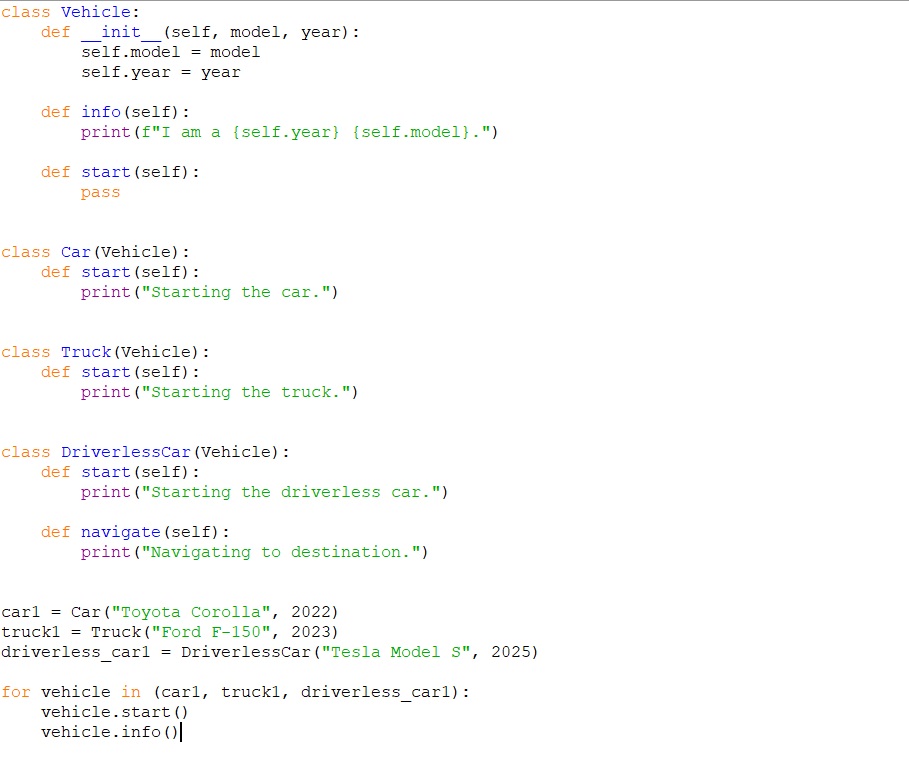Polymorphism

Polymorphism is a concept in object-oriented programming that refers to the ability of an object to take on many forms. In Python, polymorphism can be achieved through the use of function overloading, method overloading, and operator overloading.
Function overloading allows multiple functions with the same name but different arguments to be defined. When a function is called with a particular set of arguments, the appropriate function is selected based on the arguments passed..
Method overloading is a similar concept to function overloading but applies to methods within a class. Multiple methods with the same name but different arguments can be defined within a class, and the appropriate method is called based on the arguments passed.
Operator overloading allows operators such as +, -, and * to be defined for user-defined classes. This allows objects of the user-defined class to be used in the same way as built-in types.
The example below shows a program where polymorphism demonstrasted in a driveless car.

In this implementation, we have a base class Vehicle that contains the info() method and an abstract start() method. The Car and Truck classes inherit from Vehicle and override the start() method to provide their own implementation.
The DriverlessCar class also inherits from Vehicle but provides its own implementation of both the start() method and a new navigate() method.
In the for loop, we create instances of Car, Truck, and DriverlessCar and store them in a tuple. We then iterate over the tuple and call the start() method on each vehicle. Because the start() method is polymorphic, the appropriate implementation is called for each object.
We then call the info() method on each object to print out information about the vehicle. Note that because DriverlessCar inherits from Vehicle, it also has access to the info() method.
Overall, polymorphism provides a flexible and powerful tool for writing more dynamic, reusable, and maintainable code in Python. Polymorphism allows code reusability. Polymorphism allows objects to take on many forms, giving us more flexibility in how we use objects and data types.Polymorphism can make code more readable and easier to understand. Polymorphism can simplify code maintenance by reducing the amount of code that needs to be updated when changes are made to data types or objects. Because polymorphic code is more generic and adaptable, it is less likely to break when changes are made to objects or data types.
Module self reflection
This module focused on data structures and polymorphism in python programs. It is a very powerful module because it presents various building blocks to python programming.
Python has several in-built data structures that include lists, tuples, dictionaries, strings and sets. Some data types are mutable, meaning they can be modified after being created and these include lists, dictionaries and sets. Other data types are immutable, meaning they cannot be modified after being created and these include tuples and strings.
This module went further and talked about user defined data structures that can be created using classes and objects in python. Polymorphism is a powerful concept in object-oriented programming that allows objects to take on many forms. In Python, polymorphism can be applied to data structures, allowing us to write code that works with different data types and objects in a flexible and adaptable way. Polymorphism can also be applied to user-defined data structures in Python. By using inheritance and method overriding, we can create custom data structures that inherit behavior from existing data structures and provide their own unique functionality. This allows us to write more flexible and reusable code, and to create data structures that can be adapted to different use cases.
Overall, polymorphism is a powerful tool for writing flexible and adaptable code in Python, and it can be applied to a wide range of data structures, including built-in data structures and user-defined data structures.